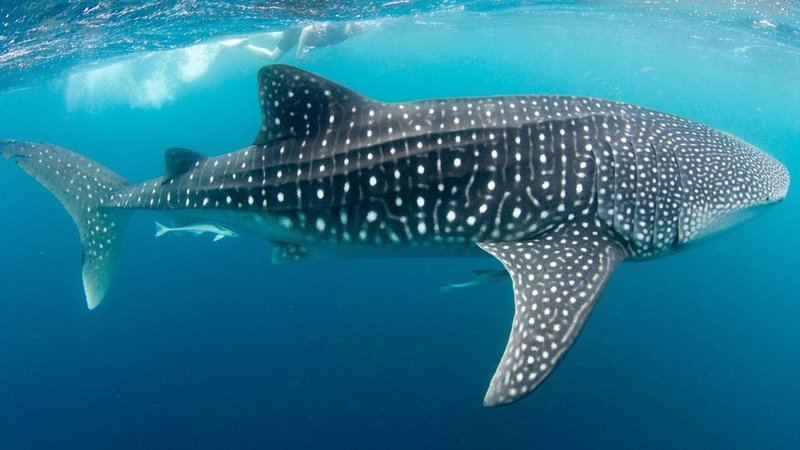
Imagine a time when you could stroll along a vibrant beach, and in the clear waters, see whale sharks gracefully swimming by. Sadly, that picture is becoming less common. The reality is that whale sharks are struggling. Their populations are declining, and many people are concerned about their future. This article will break down the status of whale sharks, the threats they face, and the ongoing conservation efforts aimed at protecting them.
What Are Whale Sharks?
Whale sharks are truly unique. Unlike the fierce predators you might picture when you think of sharks, these gentle giants are quite the opposite. They’re filter feeders, primarily consuming tiny organisms like plankton, krill, and small fish. Growing up to 40 feet long (that’s about the length of a school bus!), whale sharks have a distinctive spotted pattern on their skin, making each one unique, much like a human fingerprint.
These creatures are found in warm, tropical waters all around the globe, often near coastal areas where food is plentiful. They’re known for their calm demeanor and rarely pose a threat to humans. In fact, many snorkeling and diving enthusiasts dream of swimming alongside these gentle giants. However, even as they attract admiration, their future hangs in the balance.
Why Are Whale Sharks Endangered?
Despite their immense size, whale sharks are surprisingly vulnerable. Their populations are dwindling due to various human activities. Here are a few significant threats they face:
- Fishing: One of the primary causes for the decline in whale shark numbers is fishing. While they are not targeted specifically, they often get caught in nets or are accidentally captured as bycatch.
- Boat strikes: As more boats venture into whale shark habitats, the chances of collisions increase. These accidents can seriously injure or even kill these gentle giants.
- Habitat degradation: Pollution, climate change, and coastal development can damage the environments where whale sharks thrive. Coral reefs and other coastal ecosystems are crucial for their survival.
It’s disheartening to think that human actions significantly impact such majestic beings. This realization makes it clear that something must be done to protect them.
The Current Status of Whale Sharks
Whale sharks are classified as *Vulnerable* by the International Union for Conservation of Nature (IUCN). This classification indicates they are at risk of extinction in the wild. Their populations have drastically decreased over the past few decades. In certain areas, such as the Gulf of Mexico, their numbers have dropped by more than 90%.
You might be wondering what evidence supports this decline. Research shows that many whale shark populations are facing significant challenges. For example, monitoring programs and tagging studies have revealed that they are less frequently spotted in areas where they were once abundant. Their migratory patterns are also changing, likely in response to shifts in water temperature and food availability.
Conservation Efforts to Protect Whale Sharks
The good news is that conservation efforts are underway to help protect whale sharks. Countries like Mexico, Australia, and the Philippines have established marine protected areas where these creatures can thrive without the threat of fishing or habitat destruction. Here are a few key initiatives aimed at safeguarding whale sharks:
- Protected Areas: Setting up marine reserves helps create safe havens for whale sharks. These areas limit fishing and reduce human activity, allowing whale sharks to feed and breed without disruption.
- Awareness Campaigns: Organizations worldwide are spreading awareness about the plight of whale sharks. By educating the public, they’re fostering a sense of responsibility and encouraging eco-friendly practices.
- Research and Monitoring: Scientists are actively studying whale sharks to understand their behaviors, migration patterns, and population dynamics. This research informs policies and conservation strategies aimed at protecting these animals.
While the road ahead is tough, every effort counts.
What Can You Do to Help?
You might be thinking, “What can I do to help whale sharks?” Thankfully, there are several ways to contribute to their conservation:
- Support Conservation Organizations: Donating to or volunteering with groups dedicated to marine conservation can have a real impact.
- Practice Responsible Tourism: If you’re lucky enough to go diving or snorkeling, choose eco-friendly tours that follow guidelines for interacting with marine life.
- Spread the Word: Sharing information about whale sharks and the threats they face helps raise awareness. The more people know, the more likely they are to take action.
Every little effort can contribute to a larger change.
In summary, whale sharks are indeed facing significant threats that place them in danger. However, there’s still hope. Thanks to dedicated conservation efforts and growing awareness, we can work together to protect these magnificent creatures. Engaging in responsible practices and supporting the right organizations can make a difference.
As you sip your coffee and ponder the future of whale sharks, remember that every action counts. By caring for these gentle giants, we protect not just them but the health of our oceans as well. So, let’s keep the conversation going and support the conservation of whale sharks for generations to come.

